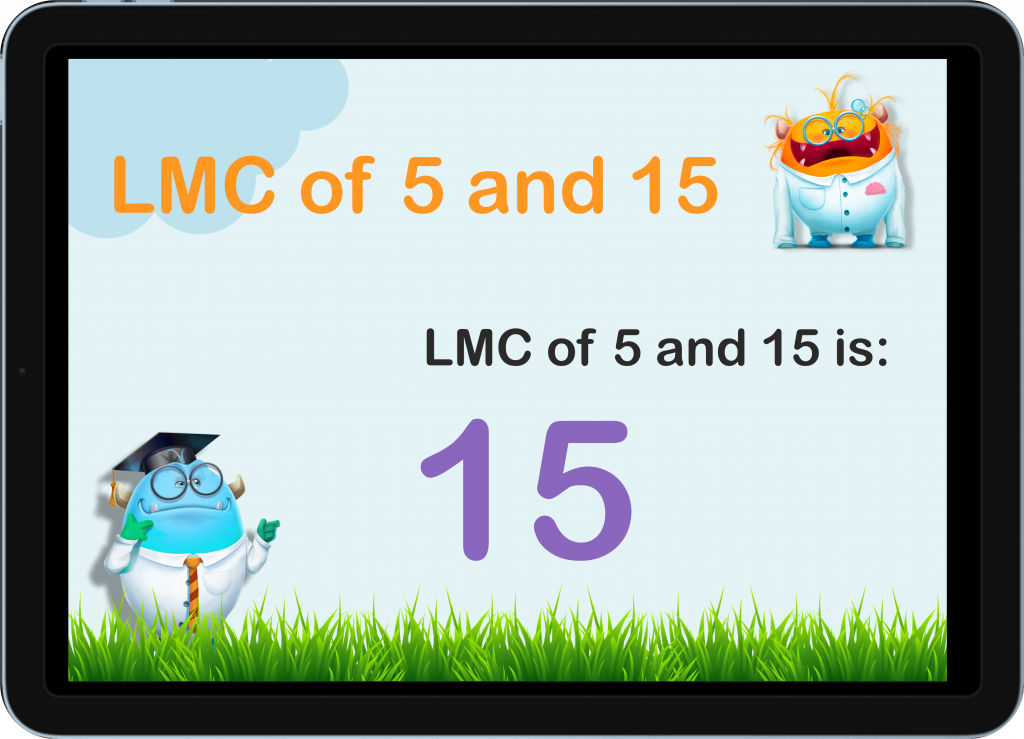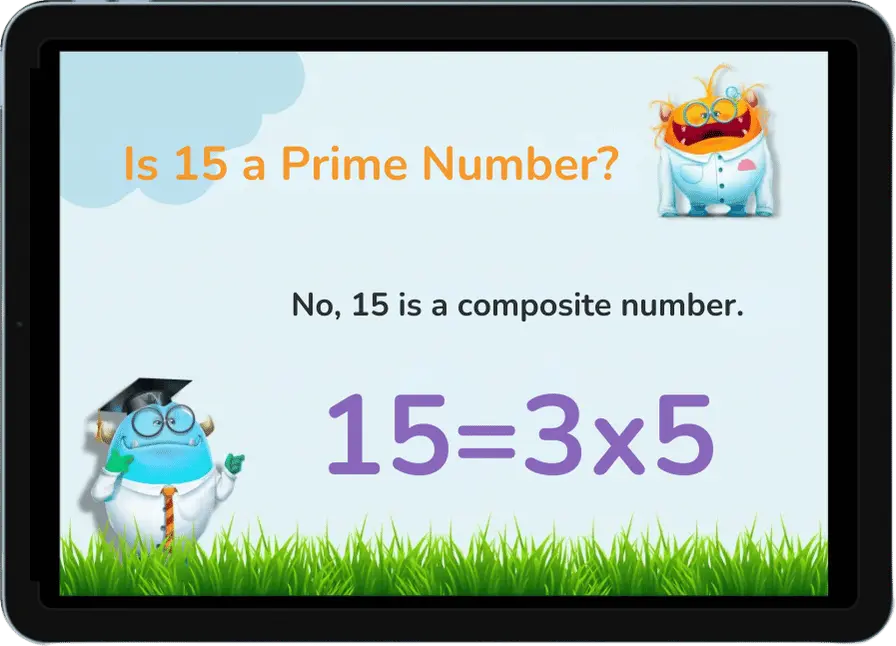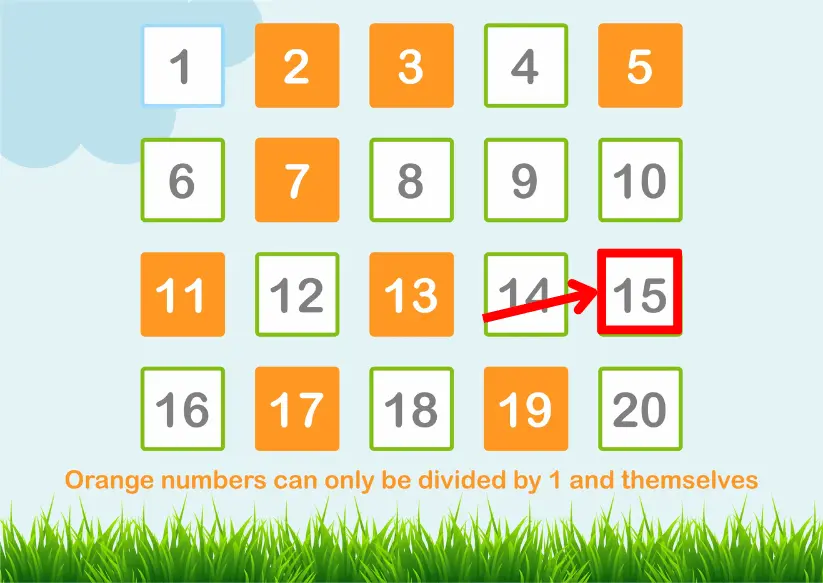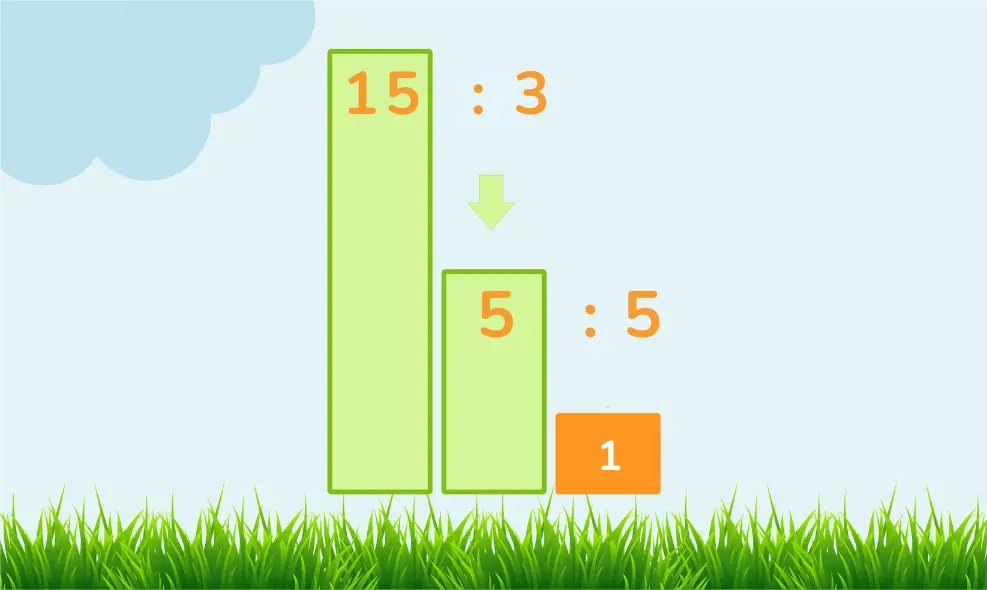Is 2 A Prime Number?
Prime vs. Composite Numbers
Greetings, young math enthusiasts! Today, let’s set sail on a mathematical voyage to determine if 2 is a prime number, and learn more about the difference between prime and composite numbers.

Is 15 a Prime Number?
Or is 15 a Composite Number?
Math should be fun to everyone – including you! Today we’re diving into the thrilling world of number 15, where we’ll learn whether it’s a prime or a composite number. Join us, it’s going to be a fun one!


No credit card required

No credit card required
What Are Prime Numbers?
Is 15 a Prime Number?
Why is 15 Not a Prime Number?
Why is 15 a Composite Number?
What are the Factors of 15?
What Type of Number is 15?
Is 15 a Semiprime Number?
What is So Special About Number 15?
Conclusion…
What Are Prime Numbers?
So, what are prime and composite numbers? Think of it like this: Prime numbers dance only with one partner for their whole life — themselves, of course, and their favorite other number, like 2, 3, and 5.
Composite numbers, on the other hand, are like a band with multiple members. They can be divided by more than just 1 and themselves. Numbers like 4, 6, and 8 are composite because they have multiple factors.
Is 15 a Prime Number?

No, number 15 is not a prime number! But why is that? Let’s find out.
Why is 15 Not a Prime Number?
The number 15 is not a prime number because it can be divided by more than just 1 and itself. You see, 15 can be divided by 1, 3, 5, and 15. Since it has more than two factors, it doesn’t belong to the exclusive prime number club. It’s a composite number, and that’s just as cool!
Is 15 a Composite Number?
Yes, 15 is definitely a composite number. Remember, a composite number has more than two factors. For 15, those factors are 1, 3, 5, and 15. So, it fits right into the composite number party with all its friends!
What are the Factors of 15?

Factors are the numbers you can multiply to get another number. So, what are the factors of 15? The factors of 15 are 1, 3, 5, and 15. This means you can multiply 1 x 15 or 3 x 5 to get 15. Pretty neat, right?
Does 15 Only Have 2 Factors?
Nope, 15 has more than 2 factors. It has four factors: 1, 3, 5, and 15. Remember, prime numbers have exactly two factors, but composite numbers like 15 can have more.
What Type of Number is 15?
So, what type of number is 15? Let’s break it down:
Composite Number: As we mentioned, 15 is a composite number because it has more than two factors.
Odd Number: 15 is an odd number because it cannot be divided by 2 without leaving a remainder. Any number ending in 1, 3, 5, 7, or 9 is considered odd.
Real Number: 15 is a real number, which means it’s a value that represents a quantity along a continuous line. All rational and irrational numbers are real numbers.
Rational Number: 15 is a rational number because it can be expressed as a fraction or ratio of two integers (15/1).
Natural Number: 15 is a natural number because it’s a positive integer. Natural numbers are used for counting (1, 2, 3, 4, …).
Whole Number: 15 is also a whole number, which includes all natural numbers and the number 0.
Integer: 15 is an integer because it is a whole number and not a fraction.
So, 15 fits into many different number categories, making it quite a versatile number!
Is 15 a Semiprime Number?
A semiprime number is a number that is the product of exactly two prime numbers. For example, 6 is a semiprime because it’s 2 x 3. Interestingly, 15 is a semiprime because it is the product of the prime numbers 3 and 5 (3 x 5). So, 15 is indeed semiprime!
What is So Special About Number 15?
Now that we’ve covered the basics, let’s dive into some fun facts about the number 15:
Calendar: There are 15 days in each half of a lunar month in many traditional calendars.
Sports: In rugby, each team has 15 players on the field.
Magic Squares: In a 3×3 magic square, the sum of the numbers in each row, column, and diagonal is 15.
Age Milestone: In some cultures, turning 15 is a significant birthday celebrated with a special party, like a quinceañera.
Conclusion
The number 15 is a fascinating composite number with lots of interesting properties and fun facts. It’s not a prime number, but that’s what makes numbers so exciting—each one is unique in its own way. Keep exploring the world of numbers, and you’ll find even more amazing facts and tricks! Happy learning!
Learn More About Prime Numbers
© 2024 Smartick. All Rights Reserved.
